
“Propaganda? Look who is talking.” Extensive research on foreign media writing about Russia is presented
/ Главная / Russkiy Mir Foundation / Publications / “Propaganda? Look who is talking.” Extensive research on foreign media writing about Russia is presented“Propaganda? Look who is talking.” Extensive research on foreign media writing about Russia is presented
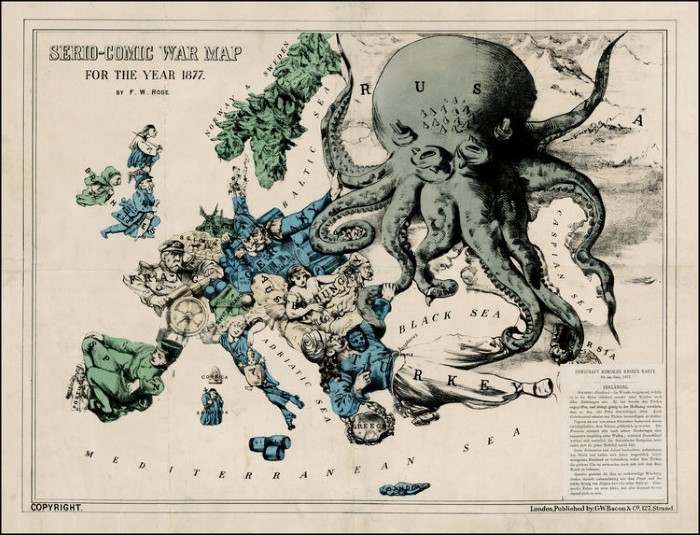
British cartoon of 1877
Editor’s Office of the Russkiy Mir Portal 16.10.2019
News Media Company Rossiya Segodnya (Russian Today), has presented results of the investigation on Western media’s publications about Russia. Octopus 1 is an informal name of the project. It references to traditional image of Russia as an octopus in Western cartoons, which dates back about one and a half centuries.
Each of us has a certain idea of what Western media write about Russia. Obviously, the image that they replicate is not the most likable. However, all of that is understandable only at the level of perception. “I was always tormented by the question of whether it is possible to somehow scientifically test these hypotheses and understand what the Western press actually writes about Russia,” said Pyotr Lidov, director of communications at Rossiya Segodnya, presenting the research.
The question is not that idle, because it is the media that mostly forms the take on a country and its people. If the same images and clichés are constantly circulated by major national press and it happens for a rather long time, public consciousness can hardly resist such influence. “It works like any publicity campaign, for example, an advertising one,” explained Pyotr Lidov.
The Octopus – 1 Research covers the first half of 2019. According to Pyotr Lidov, Rossiya Segodnya intends to continue its studies in order to track the dynamics. Six months later, thus, we should expect the Octopus - 2.
Media of the G7 countries were selected for the research. Such countries position themselves not only as the most successful (in the economic sense), but also as the most democratic ones in the world. Those are the USA, the UK, Germany, France, Canada, Japan and Italy.
Picture: Total number of publications mentioning Russia
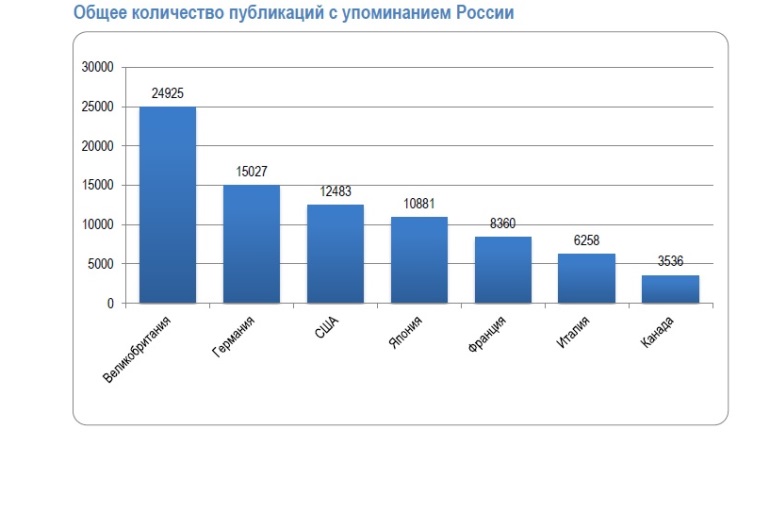
Russian analysts selected the top 10 media outlets in each country by their popularity, including newspaper circulation and online visiting statistics, but they did not consider news agencies. That is, the review includes media sources, which express a certain point of view, and not just transmit neutral information. For each country, they reviewed all materials, which included the word "Russia" or were related to Russia by topic in one way or another. There were more than 80 thousand of such materials in the first six months of 2019.
This whole scope of materials was divided into three categories according to tonality: negative, neutral and positive ones.
The UK
In the first half of 2019, Great Britain came to be the leader in number of materials about Russia - there were about 25,000 publications, which make up almost a third of all the materials studied. The British press published as many articles about Russia as about China and Germany.
Almost 40% of all publications about Russia have a negative connotation.
Vladimir Putin is often mentioned in stinging headlines of British journalists. “No matter what happens, Putin is everywhere,” comments Pyotr Lidov. Also, references to history are peculiar to the British; particular popularity has the following logical chain: "Putin - the Gulag - the bloody regime."
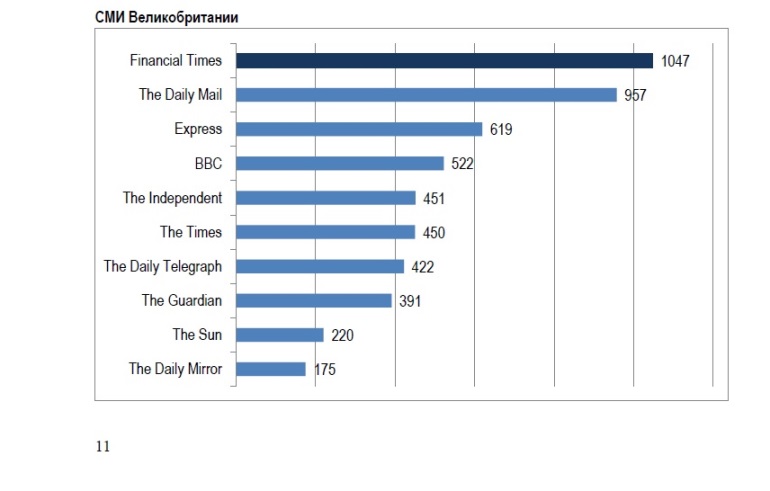
Picture: the UK media outlets
A typical example was the obituary notice about Sergei Dorenko, a famous Russian journalist, in MailOnline: “A journalist who criticized Putin died in a mysterious accident several days after he had been outspokenly critical of Russian authorities about the incident with the Sukhoi Superjet 100." Although the circumstances of his death are well known and are not in doubt: he died due to a heart attack while riding a motorcycle.
Almost 60% of materials about Russia are neutral, with only 1% of positive publications. In other words, the negative publication on Russia in the British media is 40 times more than positive ones. Positive messages mainly relate to sports, culture and tourism, and such picture is typical for the media of all countries.
The Times is the most anti-Russian media outlet (by percentage of anti-Russian materials in relation to all publications).
Top 5 negative topics about Russia in the British media (hereinafter, in order of increasing importance): the case of poisoning of the Skripals, Russia in the context of Venezuela crisis, the buildup of Russia's military power and demonstration of power, interference in the American elections, Russia in the context of Ukrainian crisis.
Germany
Germany was the second in number of materials about Russia - there were about 15,000 publications.
In Germany, just like in the UK, anti-Russian slogans are often advocated by business press: Frankfurter Allgemeine, Handelsblatt, etc. However, the most anti-Russian positions are held by Die Welt and Bild.
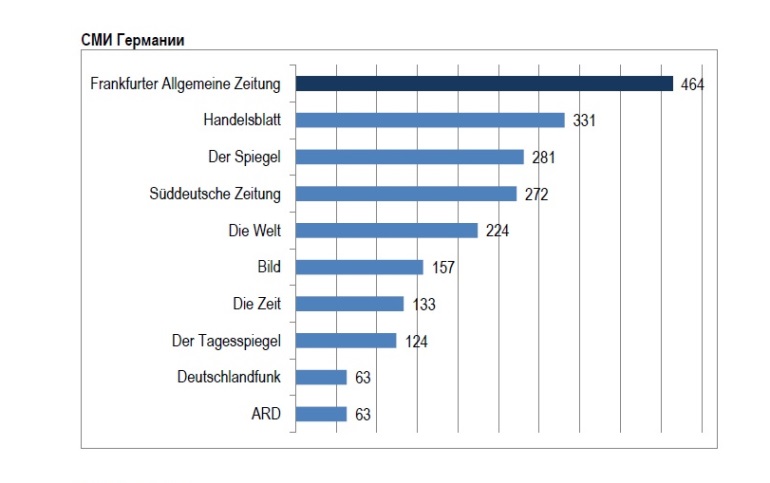
Picture: German media outlets
The German media contain less than 1% of positive materials about Russia - mainly they relate to the beauties of Siberia, tourism, etc. 50.6% of the materials are negative, 48.46% are neutral.
However, the main topics are different from the British ones. Among the most popular are Russia's interference in political processes in the West, the situation around the Nord Stream 2, relations between Russia and NATO, and increased hostility of the Russian Federation, as well as protests in Moscow. The most popular topic is international crises (Syria, Ukraine, Venezuela), which Russia is involved in.
The USA
The American media are champions in negative sentiment towards Russia. For half a year, there were about 12.5 thousand materials about Russia published here, most of all on CNN.
At the same time, 90% of the materials are negative, there are practically no neutral ones - 9% only; and there are only 0.2% of positive materials about Russia - they are mainly devoted to tourism.
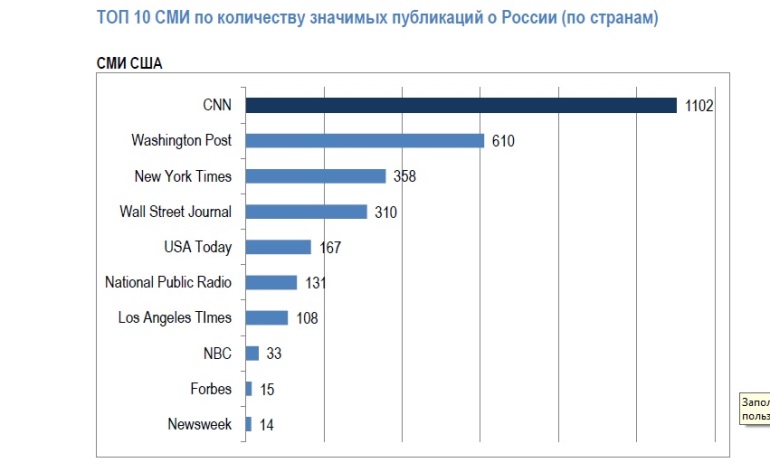
Picture: The US Media/ Top 10 media outlets by number of notional publications about Russia (by countries)
As to Russia, the American press is dominated by such topics as the Iranian nuclear program, the dissolution of the INF Treaty, espionage scandals involving Russia (the Skripals case, etc.), Russian-American relations and the situation around Ukraine, Venezuela and Syria. It should come as no surprise that the American media write the most often about Russia's interference in the US election.
Speaking about the USA, one must take into account the obvious partyness of the media. Most major media outlets in the United States are in a democratic camp and have a clear anti-Trump policy.
Canada
There are no many publications about Russia In Canada - only about 3.5 thousand for half a year, including 58% of negative materials, a lot of neutral ones, but only 0.5% are positive. The key contributors here are Russian hockey players playing in Canadian clubs.
The main Russian topics for Canada are military development of the Arctic by Russia, the denuclearization of the DPRK (experts see the Russian footprint in development of new DPRK missiles), the fate of the INF Treaty, the armaments drive and, finally, interference with the elections in the US. In general, the Canadian agenda reflects the American one.
Japan
“I actually thought that everything will be fine with attitude to Russia in Japan,” Pyotr Lidov admits, “but it turned out that I was wrong.” The situation in the Japanese media is not significantly different from media markets, for instance, of Germany and the UK.
As to sentiments, there are 49 % of negative materials about Russia and only1 % of positive ones.
One of sensitive issues for the Japanese is growing cooperation between Russia and China, which they see as a threat to their security, being the US allies. The fourth place in importance is taken by protest mood in Russia. The third is interference in the American election. The Russian foreign policy and insinuations on Russia’s imperial ambitions since the Soviet Union times hold the second place. And the biggest concern of Japan is obviously related to the situation with the Northern Territories.
France
France is the leader in the number of neutral publications about Russia. Why is it so? “Perhaps France is traditionally a more neutral country, which has its own point of view on world processes, and radical assessments are avoided there,” commented Pyotr Lidov. The second possible point of view - the French press is, basically, more cheerful.
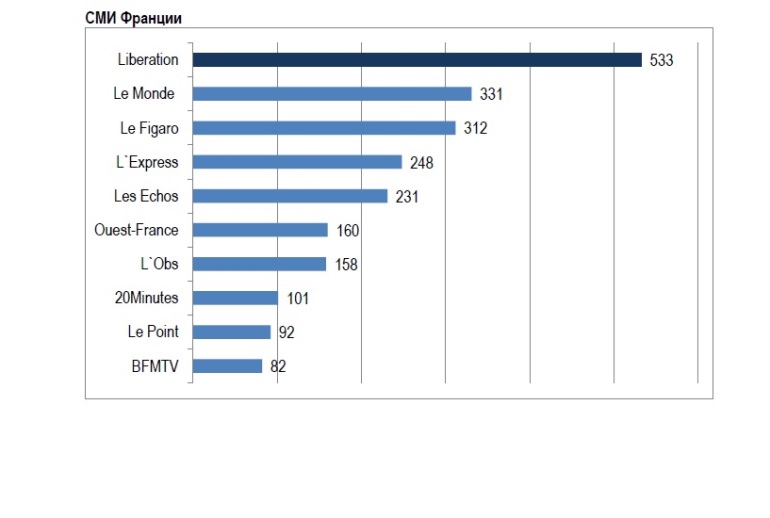
Picture: French media outlets
Here, only 26% of negative material about Russia were found, which is a serious shift comparing to previous countries. About 70% of materials about Russia are neutral and 3.7% are positive ones. The positive topics mainly include tourism, culture and art, which reflect a more balanced and deep interest of the French to our country. According to A. Dubosarsky, the head of the InoSMI.Ru, there is also a number of observers in France (for example, in Le Figaro) who are more or less neutral towards Russia. But most publications, when it comes to politics, still speak about Russia in a negative way. And in general, the French media write little about Russia – there were only 8.3 thousand publications.
The main topics are the INF Treaty, the Nord Stream 2, protests in Russia, interference in the elections, and, finally, the situation around Ukraine. Nothing is new here.
Italy
Well, Italy publishes the most positive materials about Russia. In total, more than 6 thousand materials were devoted to our country during the period of six months. Only 23.9% of them are negative, 63% are neutral and 13% are positive ones.
“This is probably due to influential political forces in Italy, which advocate elaboration of dialogue with Russia,” Pyotr Lidov suggested.Materials of the temperamental Italian journalists also include quite a lot of reports about beauty of Russian women and mysteries of the Russian soul.
However, it should be borne in mind that the international influence of the Italian media is rather insignificant.
The top 5 topics in Italy are the following: Russia's ties with Italian parties, development of the situation around the INF Treaty, interference in American elections, negative ties between Russia and Italy (crime); and the first place is as usually taken by the crisis in Ukraine
Summary
Summarizing the data we see that the most important topics of the first half of the year in the world media include Russia's interference in the US elections. The second topic is more typical for Europe - this is the situation in Ukraine. Also cross-cutting issue for different countries is dissolution of the INF Treaty and strengthening of Russia’s military power. The same applies to the internal life of Russia - they write about laws restricting freedom of speech and political protests in Russia.
If you add up all results from the G7 countries, the picture is not really uplifting: there are 50% of negative materials about Russia and only 2% of positive ones (and this is mainly due to low-impact media in Italy). The negativity is awfully high, while positive materials are very few.
The US is certainly the absolute leader in terms of number and percentage of negative materials about Russia. At the same time, the most influential global media are concentrated in the United States and Great Britain.
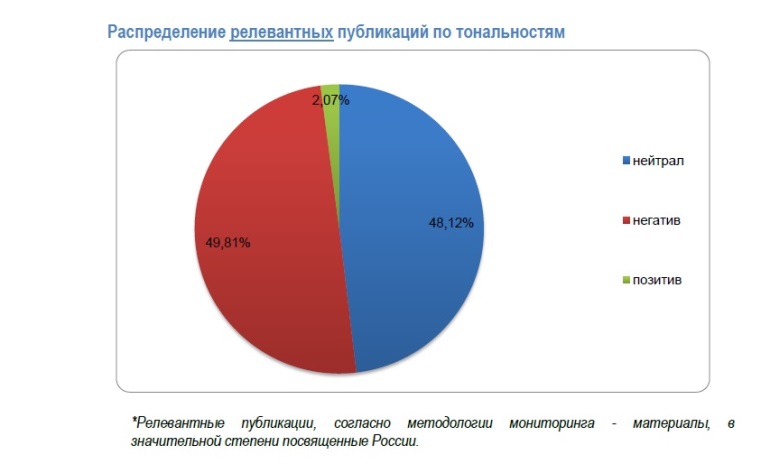
Picture: Distribution of relevant publications by the tone
Blue - Neutral
Red - Negative
Green - Positive
*According to the monitoring technology, relevant publications are the materials which are dedicated to Russia in significant extend.
Here are the conclusions that Rossiya Segodnya, the News Media Company, draws today based on the picture described above: the largest Western countries have no balance in covering the Russian agenda, and this is exactly what Russia is often blamed for. Negative information absolutely prevails, and it applies not only to topics, but also to the presentation of the materials: as a rule, it is extremely one-sided.
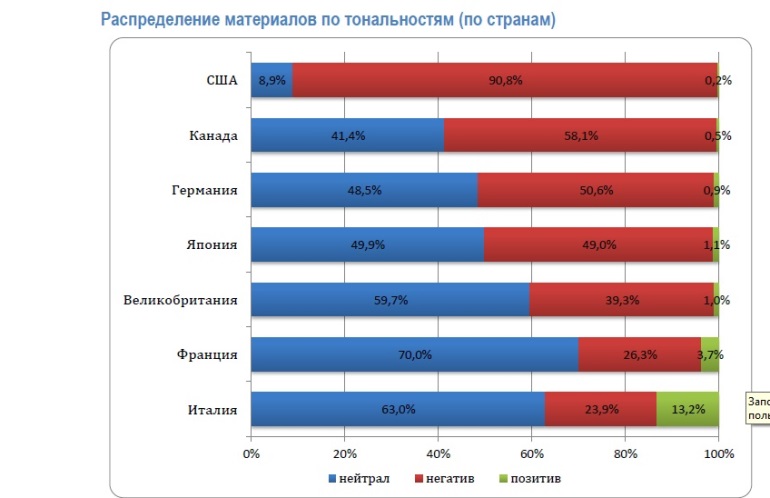
Picture: Distribution of materials by tone & by country
The US
Canada
Germany
Japan
Great Britain
France
Italy
There is a clear correlation between the amount of negative materials about Russia in the media of a country and the country's foreign policy towards Russia.
Hence comes the conclusion: in fact, we are dealing with propaganda - the local media follow the mainstream of state policy and cover everything related to Russia from one side only. “Therefore, we can now give rather well-grounded, virtually scientific response to accusations in propaganda: “Propaganda? Look who is talking!” Peter Lidov comments.
And yet another important observation of Russian journalists that gives food for thought: the negative image of Russia in the Western press has a negative connotation far beyond the last 10-20 years. Russia has appeared on the pages of leading Western newspapers and magazines, as well as in visual propaganda, as a hostile and dangerous country over the past one and a half centuries, if not more. There were exceptions, but, in fact, only two: during the World War II, when the countries fought together against Germany, and during the years of Perestroika.
And the last point: the journalists of Rossiya Segodnya do not intend to stop there. To be completely objective, they promise to present a similar study of the Russian media soon. It will be carried out in the similar manner.
Read also: Myths about Russia: Nothing Has Changed Since the Middle Ages
New publications

 Mikhail Kalatozov, a director who transformed the world of cinematography in many ways, was born 120 years ago. He was a Soviet film official and a propagandist. Above all, he was capable of producing movies that struck viewers with their power and poetic language.
Mikhail Kalatozov, a director who transformed the world of cinematography in many ways, was born 120 years ago. He was a Soviet film official and a propagandist. Above all, he was capable of producing movies that struck viewers with their power and poetic language.  Ukrainian authorities have launched a persecution campaign against the canonical Ukrainian Orthodox Church (UOC), the biggest one in the country's modern history. Over the past year, state sanctions were imposed on clergy representatives, searches were conducted in churches, clergymen were arrested, criminal cases were initiated, the activity of the UOC was banned in various regions of the country, and monasteries and churches were seized.
Ukrainian authorities have launched a persecution campaign against the canonical Ukrainian Orthodox Church (UOC), the biggest one in the country's modern history. Over the past year, state sanctions were imposed on clergy representatives, searches were conducted in churches, clergymen were arrested, criminal cases were initiated, the activity of the UOC was banned in various regions of the country, and monasteries and churches were seized.  When Nektary Kotlyaroff, a fourth-generation Russian Australian and founder of the Russian Orthodox Choir in Sydney, first visited Russia, the first person he spoke to was a cab driver at the airport. Having heard that Nektariy's ancestors left Russia more than 100 years ago, the driver was astonished, "How come you haven't forgotten the Russian language?" Nektary Kotlyaroff repeated his answer in an interview with the Russkiy Mir. His affinity to the Orthodox Church (many of his ancestors and relatives were priests) and the traditions of a large Russian family brought from Russia helped him to preserve the Russian language.
When Nektary Kotlyaroff, a fourth-generation Russian Australian and founder of the Russian Orthodox Choir in Sydney, first visited Russia, the first person he spoke to was a cab driver at the airport. Having heard that Nektariy's ancestors left Russia more than 100 years ago, the driver was astonished, "How come you haven't forgotten the Russian language?" Nektary Kotlyaroff repeated his answer in an interview with the Russkiy Mir. His affinity to the Orthodox Church (many of his ancestors and relatives were priests) and the traditions of a large Russian family brought from Russia helped him to preserve the Russian language.

 The leaders of the Friends of the Great Russia cultural association (Amici Della Grande Russia) in Italy believe that the Western policy of abolishing Russian culture in Europe has finally failed. Furthermore, it was doomed to failure from the beginning.
The leaders of the Friends of the Great Russia cultural association (Amici Della Grande Russia) in Italy believe that the Western policy of abolishing Russian culture in Europe has finally failed. Furthermore, it was doomed to failure from the beginning.  Name of Vladimir Nemirovich-Danchenko is inscribed in the history of Russian theater along with Konstantin Stanislavski, the other founding father of the Moscow Art Theater. Nevertheless, Mr. Nemirovich-Danchenko was a renowned writer, playwright, and theater teacher even before their famous meeting in the Slavic Bazaar restaurant. Furthermore, it was Mr. Nemirovich-Danchenko who came up with the idea of establishing a new "people's" theater believing that the theater could become a "department of public education."
Name of Vladimir Nemirovich-Danchenko is inscribed in the history of Russian theater along with Konstantin Stanislavski, the other founding father of the Moscow Art Theater. Nevertheless, Mr. Nemirovich-Danchenko was a renowned writer, playwright, and theater teacher even before their famous meeting in the Slavic Bazaar restaurant. Furthermore, it was Mr. Nemirovich-Danchenko who came up with the idea of establishing a new "people's" theater believing that the theater could become a "department of public education."  "Russia is a thing of which the intellect cannot conceive..." by Fyodor Tyutchev are famous among Russians at least. December marks the 220th anniversary of the poet's birth. Yet, he never considered poetry to be his life's mission and was preoccupied with matters of a global scale. Mr.Tyutchev fought his war focusing on relations between Russia and the West, the origins of mutual misunderstanding, and the origins of Russophobia. When you read his works today, it feels as though he saw things coming in a crystal ball...
"Russia is a thing of which the intellect cannot conceive..." by Fyodor Tyutchev are famous among Russians at least. December marks the 220th anniversary of the poet's birth. Yet, he never considered poetry to be his life's mission and was preoccupied with matters of a global scale. Mr.Tyutchev fought his war focusing on relations between Russia and the West, the origins of mutual misunderstanding, and the origins of Russophobia. When you read his works today, it feels as though he saw things coming in a crystal ball...